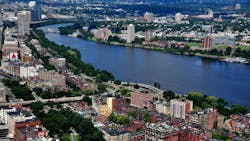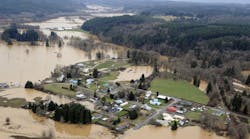EPA to require new permit coverage in Boston area watersheds
The U.S. Environmental Protection Agency (EPA) has announced actions to control stormwater pollution for the watersheds of the Charles, Mystic, and Neponset Rivers in the Boston area.
The agency announced that it is using a Clean Water Act provision called “residual designation authority,” through which EPA will require permit coverage for stormwater discharges from unregulated and uncontrolled sources of stormwater pollution for the watersheds. Certain commercial, industrial, and institutional properties with one or more acres of impervious area will be required to obtain coverage under a Clean Water Act Permit, and property owners will be required to take steps to reduce pollutants in runoff.
This is the first time that EPA has exercised its residual designation authority under the Clean Water Act on such a broad scale to address watersheds in a major urban area. The effort is expected to improve water quality throughout the watersheds, as well as reduce localized flooding.
"On the eve of the 50th anniversary of the Clean Water Act, EPA is taking strong, decisive action to ensure that all our citizens have access to local waterways that support enjoyment and recreation. It is clear that the nature and scale of the problem requires urgent action on this pressing environmental justice concern," said EPA New England Regional Administrator David W. Cash. "With a warming climate there is no time to waste to reduce bacterial and nutrient pollution in stormwater and the resulting water quality degradation including harmful algae blooms experienced yearly in all three watersheds."
EPA anticipates issuing one or more general permits specifying the activities that property owners must implement to reduce stormwater pollution from their properties. Privately owned commercial, industrial, and institutional properties with 1-acre or greater impervious cover will need to seek coverage under one of these permits (or an individual permit if they prefer) and take the actions spelled out in the permits. The general permits will be released in draft form for public comment in the future. Public comments on this determination will also be accepted at that time, consistent with EPA regulations.
The eventual new permit will likely rely on well-proven and easily implemented Best Management Practices (BMPs) — including leaf litter pickup, parking lot sweeping, installing rain gardens or other infiltration practices, planting trees, reducing pavement or utilizing pervious pavement — to reduce stormwater discharges into waterways and increase infiltration of stormwater back into the earth.
Municipal governments in Charles, Mystic and Neponset River watershed cities and towns are already subject to EPA permits that require them to take steps to reduce pollution in stormwater, and they have made significant investments to do so. However, much of this pollution comes directly from stormwater originating from certain commercial, industrial, and institutional sources — such as office parks, industrial parks, shopping centers, private colleges and universities, and hospitals — which are not currently required to be covered by an existing permit. This latest action prepares the way for greater accountability and places responsibility for cleaning up pollution squarely on those responsible — greatly reducing the burden faced by cities and towns throughout these watersheds.


